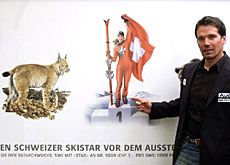Downhill skiers face uphill struggle

Ahead of the World Cup skiing season, the Swiss Ski Federation has warned that the country could spend years in the shadow of other alpine nations.
It is also cautioning against hopes that its skiers have learnt from their disastrous performance on the slopes last year.
Last season will go down in the history of Swiss alpine skiing as a winter the nation would rather forget.
Commentators dubbed the 2004/5 season “ground zero”, the year when Switzerland’s skiers hit rock-bottom, crashing out and limping home without a single World Cup victory.
They fared no better at the 2005 Alpine World Ski Championships in Bormio – the first time in four decades that the Swiss failed to pick up a medal of any colour.
Heads have since rolled, including that of Marie-Theres Nadig, the former women’s alpine-team coach.
But Swiss Ski bosses admit that personnel changes alone will not be enough to secure a triumphant return to gold-medal glory.
No quick fix
Gian Gilli, Swiss Ski’s technical director, told swissinfo it could take up to a decade to rebuild the country’s shattered reputation as a nation of top-flight alpine skiers.
“I would hesitate to use the word disaster, but it’s certainly true that we have not been very successful,” said Gilli.
“And there won’t be any miracles in future. Our main problems are with the women’s team. I think we can be more optimistic about the men’s team this year. But we have to take things step by step and progress slowly.”
Gilli said that unlike in football – where clubs can “just buy in new players” – skiers have to be trained and talent has to be nurtured.
He added that Swiss Ski “accepted” that it was now paying the price for neglecting young talent.
“What hasn’t worked very well over the past ten years is the system for developing and training [the stars of the future].”
Swiss Ski says more needs to be done to coordinate with schools in the country’s 26 cantons and encourage a new generation of youngsters to take to the slopes.
“We are losing a lot of 14- to 17-year-old skiers because it is becoming too difficult to mix school with sport,” said Gilli.
Call for cash
But before it can look to the future, the federation must first address a more pressing problem: it is strapped for cash and sponsors are drying up.
“We have some financial problems at the moment… we are looking for new sponsors but this is proving difficult,” said Gilli.
“If you have good results you are more successful in attracting sponsorship. But last year our results were not the best, so we are in trouble.”
Swiss Ski has sought to capture the imaginations and open the wallets of members of the public by launching a nationwide fundraising campaign which cashes in on recent misfortunes.
“The stars of Swiss skiing are a dying breed. Please help to save them,” pleads the campaign slogan on advertisements which liken the country’s skiers to endangered species.
Duri Bezzola, president of Swiss Ski, hopes the appeal for cash will raise SFr1 million ($780,000) to be spent on fostering new talent at the federation’s new, state-of-the-art training academy in Brig in canton Valais.
“We want to make people aware… of the huge efforts that are needed to ensure that our country continues to be among the champions [of alpine skiing],” he said.
The aim is to offer training to 140 young people at the facility in Brig as well as other alpine-skiing centres in the mountain resorts of Davos and Engelberg.
Reality check
As plans for the future are put in place, the current generation of skiers are limbering up for the season ahead and its highpoint, the Winter Olympics in Turin.
Gilli refused to “get into the game” of predicting how many medals the Swiss alpine skiers might win in Italy next February.
But he hinted that the federation would be happy with “one or two” – a meagre tally which is not far away from the dismal haul four years ago in Salt Lake City, when only a bronze by giant-slalom world champion Sonja Nef prevented the alpine team from returning home empty-handed.
Olympic disappointment in 2002 was a far cry from the golden year of 1987, when Switzerland bagged a total of 14 medals at the world championships in Crans Montana.
“Of course it’s not realistic to think that we can match that performance,” said Gilli.
“But if we plan for a period of ten years and come up with a long-term strategy, the potential for success in Switzerland is very high. That is our dream and our vision for the future.”
swissinfo, Ramsey Zarifeh
The nationwide fundraising campaign aims to raise SFr1 million.
All cash pledged by the public will be invested in nurturing new talent.
The Swiss Ski Federation is developing a new, state-of-the-art national training facility in Brig in canton Valais.
The first World Cup ski meeting of the new season gets underway in Sölden, Austria, on October 22.
The 2006 Winter Olympics are scheduled to take place in Turin, Italy, from February 10 to 26.

In compliance with the JTI standards
More: SWI swissinfo.ch certified by the Journalism Trust Initiative









You can find an overview of ongoing debates with our journalists here . Please join us!
If you want to start a conversation about a topic raised in this article or want to report factual errors, email us at english@swissinfo.ch.